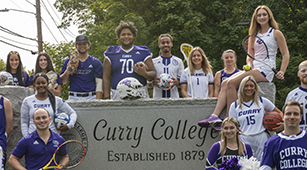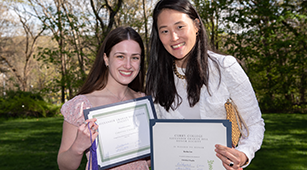PAL academic courses facilitate students’ self-understanding and regulation of learning for strategic application and success at the post-secondary level. During the academic year, students work with faculty mentors whose educational scholarship and experience include transition studies, applied cognition, strategic learning, and emerging adult and adult development.
Courses in PAL consist of curriculum with individualized approaches in the areas of metacognition, self-regulation, active learning, critical thinking and reasoning, decision-making, and language skills:
Required for First-Year Students:
Learning Process I - PAL 1190
This course is the first in the two-course sequence required for students admitted to Curry College through the Program for Advancement of Learning. Focused on the transition from high school learning expectations to those of college courses, PAL 1190 offers students a curriculum designed to foster an understanding of themselves as learners through faculty mentorship.
Students are introduced to and explore learning strategies in the following core areas: metacognition, self-regulation, active and engaged learning, critical thinking and reasoning, receptive and expressive language. Students will create an educational plan, outlining: personal and academic long-term goals, semester goals, learning strengths, challenges, and strategies. The faculty mentor and student collaborate on evaluating student progress towards these goals throughout the semester, culminating in a reflective student paper and faculty report, which outlines individualized recommendations for the PAL 1200, the second course in the sequence.
Learning Process II - PAL 1200
This course extends the learning insights and strategies acquired in PAL 1190, fostering greater independence and strategic learning in metacognition, self-regulation, critical thinking and reasoning, receptive and expressive language, and decision making. Students will refine their PAL 1190 educational plans, integrating lessons from the prior semester and adapting to the current semester's course requirements. PAL faculty and students jointly assess progress toward these objectives throughout the semester, culminating in a reflective student paper and faculty report.
Elective Courses (for those opting to remain in PAL):
PAL 1195 - Connections to Learning
3 elective credits
This course provides opportunities for students to learn more about different ways of knowing as they delve deeply into their own personal learning, using current theories as well as previous academic and personal college experiences as the foundation for thoughtful reflections and goal setting. Various learning theories will provide a springboard for class discussions providing forums for sharing experiences and insights within a community of learners. Connections will be made between theory and practice, to further enhance metacognitive awareness. This course is designed to practice and reinforce diverse strategies and methods of learning in order to enhance and improve personal and academic success.
PAL 1210 - Advancement in Learning
Designed for students who have completed PAL 1190 and 1200, this course offers ongoing guidance from PAL faculty in refining and implementing strategic learning techniques to excel in advanced coursework. Students enrolled in PAL 1210 participate in individualized or small group sessions with their instructors twice weekly.
PAL 1220 - Learning Transitions
Available to students who have finished PAL 1190 and 1200, this course offers continuous support from PAL faculty in cultivating and employing strategic learning strategies for academic advancement. Students enrolled in PAL 1220 participate in individualized or small group sessions with their instructors once weekly. This course is repeatable.
Prerequisite: PAL 1200 or PAL 1210






